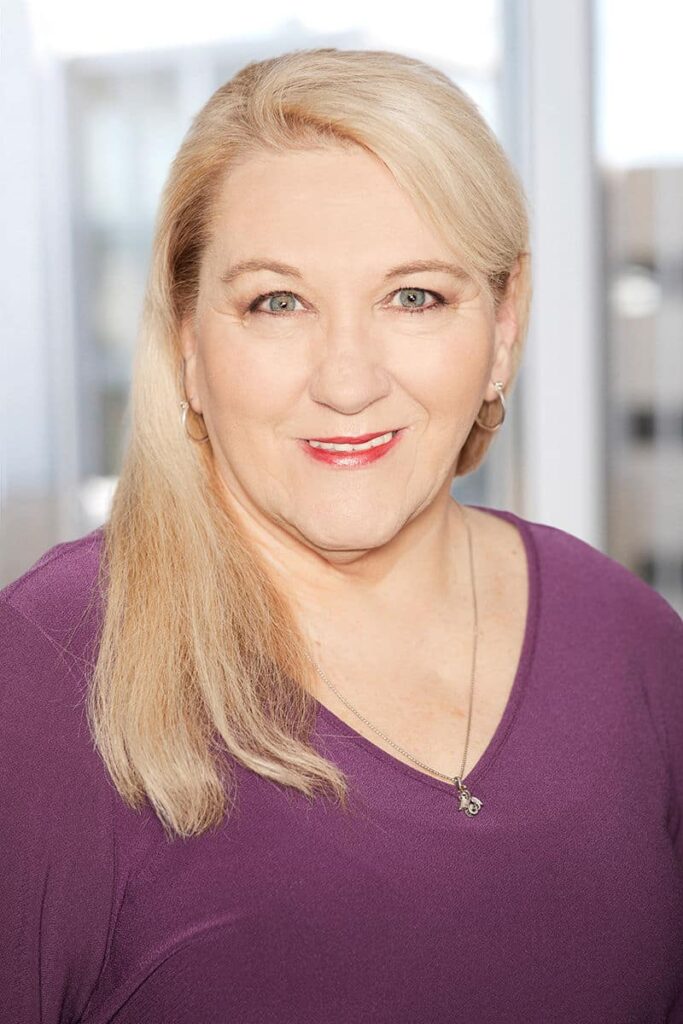We close our Women in Construction Week celebration by honoring Total-Western’s Payroll Director, Vickie Lamb.
Vickie has been in the industry for more than 30 years. Back in the nineties, when the U.S. was experiencing a recession, Vickie and her husband had to look for financial income outside of their auto repair business – just like many other businesses at the time. Their determination to keep their head above water brought them to California from the Midwest. What was supposed to be a temporary job for her ended up being the start of a successful career.
For Vickie, the construction industry wasn’t just a career path…it was where she rediscovered herself and the natural-born leader she was meant to be. Before getting married, Vickie had always held leadership roles and considered herself to be an independent woman. However, during her marriage, she lost sight of that version of herself. We had the opportunity to sit down and further ask Vickie about her journey, career challenges, and her thoughts on how to get more women involved in the construction industry.
Q: What led you to the construction industry?
To be honest, I never saw myself in the construction industry, but I began working in the field in 1989. At that time, my husband’s family worked for Western Industrial, and they asked us to help with a turnaround job in California. My husband filled a position on the mechanical side of the project, and I was brought on to be assistant timekeeper to my sister-in-law who was the onsite timekeeper of the project. Upon completion of the job, my husband was offered a permanent position, so we moved out here.
Q: Can you tell us a bit more about what your journey in the construction industry has been like since you left the Midwest?
I have done a bit of everything when it comes to timekeeping. At the beginning of my career, all the job assignments I received were temporary, but after some time I was finally able to earn a permanent job with Exxon Mobil. I started out as a timekeeper and then worked my way up the ladder to the dispatch department. I went from entry-level dispatcher to lead dispatcher, to timekeeper supervisor, payroll manager and, now, payroll director.

Q: What has been the most memorable project you worked on in your career and why?
In 1990 I was given the opportunity to work on a major project with Exxon Mobile. This project forced me to take ownership of a new role and new responsibilities. It was an eye-opening experience where I realized I can be a leader. It was a part of myself I had forgotten and this project brought it out of me. I can best describe it as the project where I got Vickie back; I had lost her for a few years.
Q: What would you say is the best part of your current role?
The best part of my job is working with all of Total-Western’s employees; without them I wouldn’t have a job. They always show appreciation to those of us in payroll and I love being able to help them in any way I can.
Q: What do you think are some of the advantages of being a woman in the industry?
I believe women handle stress better than men, especially in time-sensitive projects. Women can focus and multitask and are usually very organized.
Q: There are physical and emotional challenges that come with working as a woman in construction. What are some of the challenges that you have faced as a woman?
The biggest challenge I feel women face in this industry is earning respect from their male co-workers, especially at management levels. Throughout the years, I have witnessed male individuals take credit for the work women do or the solutions they come up with. This is a major reason why I advocate for employees to speak up whenever something isn’t right.

Q: What makes you proud of working in the construction industry?
This industry has so many opportunities for individuals who don’t necessarily have higher education. To get to learn on the job and self-promote your skills…you don’t see that in other industries.
Q: From your perspective, how has the industry evolved or progressed since starting your career?
In my opinion, the industry has really progressed when it comes to technology. When I first started in payroll, timekeeping was done by hand with carbon copies, timebooks, and handheld calculators. Now, we have software and programs that help us track and calculate all our timekeeping which allows us to be more efficient.
Q: How do you think construction can attract more female candidates?
This is a very hard task in my opinion…unless a woman grows up with family or friends in the construction industry, they are more than likely not going to see themselves having this career path. I think sharing more of our stories can help with that. I never saw myself coming to California or having a leadership role, so if I can do it, anyone else can.
Q: What advice would you give to a young woman entering the industry now?
Always take advantage of the training opportunities you come across and take the time to learn the latest software and programs for your role. The software we use is always changing, so the more comfortable you can get using it, the more it will help in your career. In payroll, it’s also very important that you understand the types of jobs that employees will be working on. Lastly, in my 33+ years in the industry, I’ve learned that nothing is impossible. Behind every successful woman is HERself, HER team, HER hard work, HER drive, and HER commitment.
.

